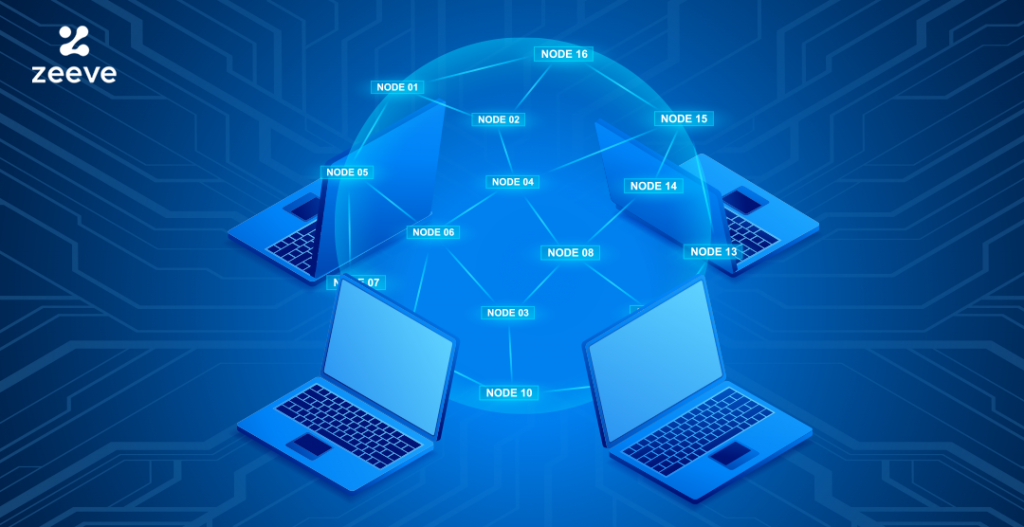Running your blockchain node could be one of the most challenging jobs when you are just starting. Initially, the focus is mostly on scaling fast by utilizing the services present in the ecosystem for optimized blockchain node infrastructures. It will help you focus on developing your application or product while the service provider takes care of nodes in the background. But, do you know what a node is?
Let’s start the blog by explaining what a node is, how node services work, the pros and cons, and the best node service providers in the crypto space.
What are nodes?
A node is a running piece of client software. Whereas a client verifies all transactions in each block, keeping the network secure and the data accurate. A client can run three types of nodes – light, full, and archive.
- Light Node: A light node enables users to participate in the network without the powerful hardware or high bandwidth required to run full nodes. We can even run them on mobile phones.
- Full node: A full node stores blockchain data and participates in block validation. The responsibility of full is to verify all blocks and states.
- Archive node: An archive node stores everything present in the full node and builds an archive of historical states. The data comes in handy for services like block explorers, wallet vendors, and chain analytics.
What is Node as a Service?
Node as a Service (NaaS) is a hands-on approach for node operation without needing technical expertise. You can use a node as a service even if you do not know how to build and manage infrastructure. The companies generally provide a new node that you can configure to add data and manage your identity on the network.
NaaS takes the same reliable and flexible infrastructure built for the staking platform and allows anyone who wants to run a node to use it. You only need to manage your staked tokens, data, and identity as the service providers will take care of redundancy, backups, upgrades, and security.
How do blockchain node services work?
The blockchain node service providers take the pain from you by running distributed node clients. The service providers provide an API key to write and read from the blockchain. While some services offer you a dedicated node they manage for you, others use load balancers to distribute activity across nodes.
Factually, node services are effortless to integrate and involve one-line changes in your code to swap out your self-hosted node or even switch between the services. Often, node services will run a variety of node clients and types, allowing you to access full and archive nodes in addition to client-specific methods in one API.
Note that node services do not store your private keys or information.
What are the benefits of using a node service?
A node service cuts down on time you will spend maintaining and managing nodes by yourself. It lets you focus on the core work – building your product – rather than worrying about infrastructure maintenance.
Since running your own nodes can be very expensive, a node service will help you cut down on the costs. If you plan to go for your own node, you must spend from storage to bandwidth to valuable engineering time. Spinning up more nodes, upgrading nodes to the latest versions, and ensuring state consistency, can distract from building resources on your desired web3 product.
However, node service also induces the essence of centralization in the infrastructure aspect of your product. It is for the same reason why projects that hold decentralization to the utmost importance might not outsource to a 3rd party and would prefer self-hosting nodes.
Which service provider should you choose for your node?
It is essential to consider some parameters before choosing your node service provider. Consider services, prior experience, pricing model, and security services as the pointers before selecting a node provider. Since team support is crucial, ensure that the company’s services are user-friendly and cost-effective.
Ensure that you examine the level of security and check on the track record of the node deployment service. Zeeve is one of the leading blockchain as a service (BaaS) platforms that support businesses and start-ups to create, deploy, and manage decentralized applications and blockchain networks. Zeeve will take care of all your needs so you can help the network you support and connect to maintain its vision of optimized decentralization.
The team at Zeeve is proficient in more than 15 blockchain protocols, with over 2000 nodes deployed in the ecosystem. They have a vast developer community with more than 45 blockchain experts that will handle some of the famous public and permissioned blockchain protocols.
Public blockchain protocols
Ethereum
Zeeve’s enterprise-grade node deployer will help deploy your smart contracts or DApps on Ethereum Blockchain. Our team provides top-notch security with a reliable and high-performing blockchain infrastructure for your needs.
Bitcoin
Zeeve supports automated full node deployment of Bitcoin with top-notch security. Our expert team eases the deployment procedure by pre-installing the dependencies and running nodes with default features.
Polygon
Zeeve’s node deployer will deploy your smart contracts or DApps on the Polygon blockchain. Our expert team has years of experience providing a high-performing blockchain infrastructure for your needs.
Binance Smart Chain
Zeeve’s node deployer will help deploy your smart contracts or DApps on Binance Smart Chain (BNB Chain). Our in-house team is capable of providing blazing performance in deploying BSC nodes on the cloud of your choice.
AXIA
Zeeve is the partner for AXIA Network developer and validator nodes. Use our reliable infrastructure automation platform to deploy AXIA Developer and Staking nodes that ensure blazing performance.
Tron
Zeeve’s node deployer will deploy your DApps or smart contracts on the Tron Blockchain. Our expert team has years of experience providing a high-performing blockchain infrastructure for your needs.
Fantom
Zeeve’s node deployer will deploy your DApps or smart contracts on the Fantom Blockchain. Our expert team has years of experience providing a high-performing blockchain infrastructure for your needs.
Avalanche
Zeeve’s enterprise-grade node deployer will help deploy your smart contracts or DApps on Avalanche Blockchain. Our team provides top-notch security with a reliable and high-performing blockchain infrastructure for your needs.
Permissioned blockchain protocols
R3 Corda
Zeeve enables you to launch your R3 Corda nodes in a few clicks on enterprise-grade cloud infrastructure. Our expert team will help you deploy and run your CorDapps using our intuitive GUI.
HyperLedger Sawtooth
Zeeve helps you to seamlessly launch a HyperLedger Sawtooth network using our configuration manager instantly. We also provide an analytical dashboard to monitor your nodes, cloud resources, and underlying blockchain in real-time.
Hyperledger Fabric
Zeeve will be your perfect choice to launch a robust and optimized multi-orderer Hyperledger Fabric network over the cloud. Our team will also help you with analytics and monitoring of your nodes in real-time.
Fluree
Launching Fluree nodes is more accessible than before. Zeeve helps to deploy Fluree nodes on the cloud in minutes. Our team will also help you with analytics and monitoring of your nodes in real-time.
Partner with Zeeve for node deployment
Zeeve provides Enterprise Blockchain Management Platform capabilities to DevOps teams deploying and managing Blockchain nodes and networks. Our team is proficient in managing the nodes for you to save your time from indulging in the process. Zeeve is an enterprise Blockchain Management Platform that can handle the Blockchain network efficiently.
Our expert team allows you to launch your nodes in multiple regions to induce an essence of geographically dispersed dedicated machines. It helps us to keep the network decentralized. We monitor your node throughout its lifecycle for parameters such as bandwidth, CPU load, available disk space, and memory in real-time. It helps us to alert thresholds set internally so the platform can automatically remediate any errors before they occur.
Get in touch with our team to learn about our blockchain sharing, managing, and deploying infrastructure platform.




